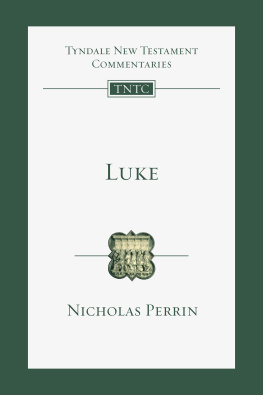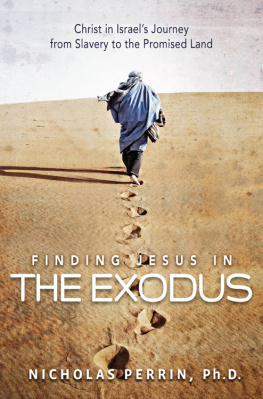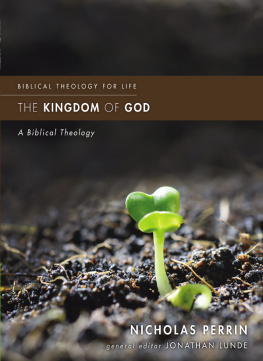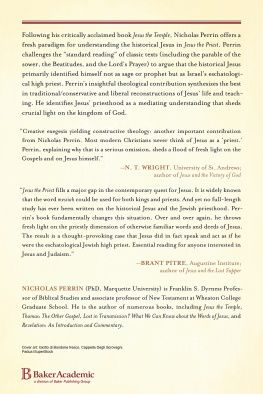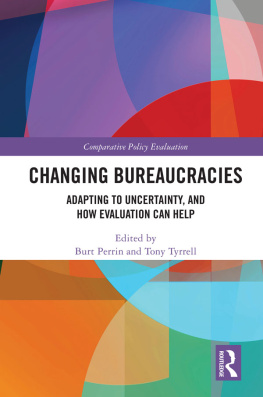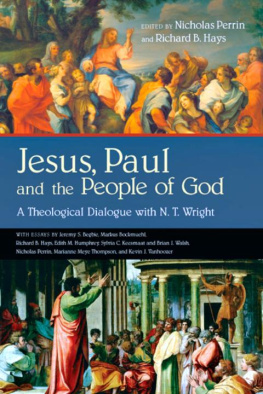Nicholas Perrin - Luke
Here you can read online Nicholas Perrin - Luke full text of the book (entire story) in english for free. Download pdf and epub, get meaning, cover and reviews about this ebook. year: 2022, publisher: InterVarsity Press, genre: Religion. Description of the work, (preface) as well as reviews are available. Best literature library LitArk.com created for fans of good reading and offers a wide selection of genres:
Romance novel
Science fiction
Adventure
Detective
Science
History
Home and family
Prose
Art
Politics
Computer
Non-fiction
Religion
Business
Children
Humor
Choose a favorite category and find really read worthwhile books. Enjoy immersion in the world of imagination, feel the emotions of the characters or learn something new for yourself, make an fascinating discovery.
- Book:Luke
- Author:
- Publisher:InterVarsity Press
- Genre:
- Year:2022
- Rating:4 / 5
- Favourites:Add to favourites
- Your mark:
- 80
- 1
- 2
- 3
- 4
- 5
Luke: summary, description and annotation
We offer to read an annotation, description, summary or preface (depends on what the author of the book "Luke" wrote himself). If you haven't found the necessary information about the book — write in the comments, we will try to find it.
Luke — read online for free the complete book (whole text) full work
Below is the text of the book, divided by pages. System saving the place of the last page read, allows you to conveniently read the book "Luke" online for free, without having to search again every time where you left off. Put a bookmark, and you can go to the page where you finished reading at any time.
Font size:
Interval:
Bookmark:


For my beloved son Luke
Whether far or near, you are always with me in my heart.
 InterVarsity Press
InterVarsity Press
P.O. Box 1400 | Downers Grove, IL 60515-1426
Inter-Varsity Press, England
36 Causton Street | London SW1P 4ST, England
2022 by Nicholas Perrin
Nicholas Perrin has asserted his right under the Copyright, Designs and Patents Act, 1988, to be identified as Author of this work.
All rights reserved. No part of this publication may be reproduced, stored in a retrieval system, or transmitted, in any form or by any means, electronic, mechanical, photocopying, recording or otherwise, without the prior permission of the publisher or the Copyright Licensing Agency.
InterVarsity Press, USA, is the book-publishing division of InterVarsity Christian Fellowship/USA and a member movement of the International Fellowship of Evangelical Students. Website: intervarsity.org.
Inter-Varsity Press, England, originated within the Inter-Varsity Fellowship, now the Universities and Colleges Christian Fellowship, a student movement connecting Christian Unions in universities and colleges throughout Great Britain, and a member movement of the International Fellowship of Evangelical Students. That historic association is maintained, and all senior IVP staff and committee members subscribe to the UCCF Basis of Faith. Website: www.uccf.org.uk.
Unless otherwise stated, Scripture quotations are from the New Revised Standard Version of the Bible, Anglicized edition, copyright 1989, 1995 by the Division of Christian Education of the National Council of the Churches of Christ in the USA, and used by permission. All rights reserved.
First published 2022
USA ISBN 978-1-5140-0536-1 (digital)
USA ISBN 978-1-5140-0535-4 (print)
UK ISBN 978-1-78359-923-3 (digital)
UK ISBN 978-1-78359-922-6 (print)
The Tyndale Commentaries have been a flagship series for evangelical readers of the Bible for over sixty years. Both the original New Testament volumes (19561974) as well as the new commentaries (19832003) rightly established themselves as a point of first reference for those who wanted more than is usually offered in a one-volume Bible commentary, without requiring the technical skills in Greek and in Jewish and Graeco-Roman studies of the more detailed series, with the advantage of being shorter than the volumes of intermediate commentary series. The appearance of new popular commentary series demonstrates that there is a continuing demand for commentaries that appeal to Bible study leaders in churches and at universities. The publisher, editors and authors of the Tyndale Commentaries believe that the series continues to meet an important need in the Christian community, not the least in what we call today the Global South with its immense growth of churches and the corresponding need for a thorough understanding of the Bible by Christian believers.
In the light of new knowledge, new critical questions, new revisions of Bible translations and the need to provide specific guidance on the literary context and the genre of the individual passages as well as on theological emphases, it was time to publish new commentaries in the series. Three authors have revised their commentaries that appeared in the second series. The original aim remains. The new commentaries are neither too short nor unduly long. They are exegetical and thus root the interpretation of the text in its historical context. They do not aim to solve all critical questions, but they are written with an awareness of major scholarly debates which may be treated in the Introduction, in Additional Notes or in the commentary itself. While not specifically homiletic in aim, they want to help readers to understand the passage under consideration in such a way that they begin to see points of relevance and application, even though the commentary does not explicitly offer these. The authors base their exegesis on the Greek text, but they write for readers who do not know Greek; Hebrew and Greek terms that are discussed are transliterated. The English translation used for the first series was the Authorized (King James) Version, the volumes of the second series mostly used the Revised Standard Version; the volumes of the third series use either the New International Version (2011) or the New Revised Standard Version as primary versions, unless otherwise indicated by the author.
An immense debt of gratitude for the first and second series of the Tyndale Commentaries was owed to R. V. G. Tasker and L. Morris, who each wrote four of the commentaries themselves. The recruitment of new authors for the third series proved to be effortless, as colleagues responded enthusiastically to the opportunity to be involved in this project, a testimony to the larger number of New Testament scholars capable and willing to write commentaries, to the wider ethnic identity of contributors, and to the role that the Tyndale Commentaries have played in the church worldwide. It continues to be the hope of all those concerned with this series that God will graciously use the new commentaries to help readers understand as fully and clearly as possible the meaning of the New Testament.
Eckhard J. Schnabel, Series Editor
Nicholas Perrin, Consulting Editor
The Gospel of Luke holds out its central character Jesus Christ as the fulfilment of the Scriptures and the human climax of redemptive history. In this respect, the third Gospel is eminently simple in what it attempts to do: it tells the story of what this Jesus began to do Acts would pick up the story from there. In the Gospels opening pages, it quickly becomes apparent that Lukes tale does not float about in the ether, as if the events he relates were somehow strangely above history. No, it is a story about a God-man who enters into history, only to collide with its most significant stakeholders. Think of how many aspects of Lukes Gospel can be pinned down to a specific time and place. The Evangelist intended it that way. As the first historian in the church, he insists that the gospel contained within his Gospel was enmeshed in the messy timespace continuum we know as human history.
For the purposes of this commentary, I have attempted to take this point seriously. After all, if Luke took human history seriously then so too should his interpreter. That human history begins as far as our Gospel writer is concerned with the story of Israel, as contained in Israels Scriptures. This has no uncertain hermeneutical significance. In the first instance, the weightiness of Israels prior story requires our attending to the redemptive-historical storyline and avoiding the error of the second-century Gnostic theologian Marcion, when he attempted to apply a scalpel to the third Gospel in the hope of disassociating it from the Hebrew Scriptures. At the end of the day, his was a vain endeavour. Wanting to have Luke apart from its scriptural roots is like attempting to have the ocean without its salt. Of course, it is chemically possible to separate ocean water from its salt, but then at that point it would no longer be ocean water! The Hebrew Scriptures suffuse the thought-world of the New Testament authors across the board and Luke is no exception. Our exegesis should reflect as much. Though some of my readers may complain I am sometimes too quick to suppose intertextual correspondences between Lukes writing and the Scriptures, I would only remind these same readers of what the Evangelist himself wrote about Jesus: Then beginning with Moses and all the prophets, he interpreted to them the things about himself in all the scriptures (24:27). It is impossible to do justice to this writing without circling back to the Scriptures at multiple points. The responsible identification of scriptural allusions in Lukes text necessarily depends on various criteria that allow for degrees of plausibility or implausibility, probability and improbability. Yet this is as much art as it is a science. In cases of an alleged echo of the Scriptures, New Testament commentators on the minimalist side will demand clear and convincing evidence before even mentioning the possibility of an allusion. By contrast, this commentary will set the evidentiary bar to a preponderance of evidence: where scriptural allusions are more probable than improbable, these deserve mention, even if there is a sliding scale of certainty in these matters.
Next pageFont size:
Interval:
Bookmark:
Similar books «Luke»
Look at similar books to Luke. We have selected literature similar in name and meaning in the hope of providing readers with more options to find new, interesting, not yet read works.
Discussion, reviews of the book Luke and just readers' own opinions. Leave your comments, write what you think about the work, its meaning or the main characters. Specify what exactly you liked and what you didn't like, and why you think so.

